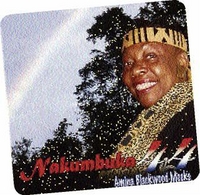Blackwood Meeks celebrates Obama with Nakumbuka 44
Published: Sunday | February 22, 2009

Nakumbuka means 'I remember' and, by attaching the number 44 to it for the title of her recently released four-track CD, storyteller Amina Blackwood Meeks points directly to the 44th president of the United States of America.
Blackwood-Meeks' Rainbow Warrior, Nakumbuka and Lessons from His Story are all done to music from percussionist M'Bala, who also contributes 'Laas Story' to the set.
Blackwood-Meeks told The Sunday Gleaner that Nakumbuka 44 was released on January 17, three days before Obama's inauguration.
"I suppose I got the idea on November 4th (the day of the US election). I was in England. Stuff just started coming out of me, so I selected these stories from the stuff," Blackwood Meeks says.
"I think it is important for people who write or sing or paint to document history in the way they were meant to document history," she says.
the "naysayers"
In 'Rainbow Warrior', Blackwood Meeks refers consistently to 'they' and what 'they' have to say ("saying that you're half-rich, but they can't say you're poor"). She says the 'they' are the "naysayers", who from the very beginning hinted that "Obama is less American because his father is from Kenya. They tried to discredit him."
It is the same they, she says, that Marley referred to when he sang "me no know how me an dem a go work it out".
M'Bala's flute introduction to 'Rainbow Warrior' is the children's rhyme that teaches colours ("orange and purple and blue") and it also contains the "one and twenty, two and twenty ...", sung by harmony vocalists Debbie Pottinger and Charlene Brown. It does not mean, though, that the target audience is children.
"I hope everybody will understand," Blackwood Meeks says. "But part of my present mission is that the songs and nursery rhymes I grew up on are preserved, so I made a conscious decision to embed them in my stories and poems."
And Rainbow 'Warrior' also speaks about Obama's parents, saying that his father "taught you through civil eyes how to rule the land of the free". Blackwood-Meeks cites Obama's book 'Dreams of My Father', which shows his father's influence as a community activist. "He has learnt what it means to be a civilised human being and taken that into his vision of changing America," Blackwood-Meeks says.
As for the title, which is the name of two Greenpeace ships, the first of which was sunk by the French intelligence services in 1985, Blackwood-Meeks says she intends 'rainbow' to "have all the implications - rainbow people, those who have multiple ethnicities. But we can't allow the Rainbow Warrior to be sunk, to be aborted before the mission is completed".
building pyramids
Nakumbuka speaks consistently to "what we just did", including building the pyramids, as well as the Maroons and Patrice Lumumba, concluding "we put a black man in the White House". Blackwood-Meeks tells The Sunday Gleaner "this is one more ting that we do because we can do it. It is an affirmation of all we did".
As for achievements like the pyramids, she says, "it is touchable. I can touch it. It influences what we can do today. Some principles don't change."
And there is a vigorous 'no' when The Sunday Gleaner asks if 'Lessons from His Story' is an indictment on male leadership, saying that is "not part of who I am. I am using his story, as some have used history to separate us from our story".
"Family is so crucial to what our leaders can accomplish, the immediate family they live with and how they treat them, the extended blood family and the family of nations," she says.
"It is skill, more than gender."
She points out that "leaders follow, really, so we have to show them where we want to go".
natural fit
M'Bala was a natural fit for Nakumbuka 44, as Blackwood-Meeks has worked with him since she returned to Jamaica 12 years ago, doing the music for her one-woman shows. She actually chose 'Laas Story' from a number of poems M'Bala presented. "I really wanted him to be on it as a voice. He is a fantastic voice," she says. And Blackwood-Meeks laughs as she says that it was not M'Bala's preferred poem for the set.
Still, she points out "it is thematically in sync about so many things that we have done that we have not been credited for".
Blackwood-Meeks hopes Nakumbuka 44 will not only get a wide listenership, but be put into the Jamaica Cultural Development Commission's catalogue of work.
"I would like to see students in the upper levels of high school and teachers at colleges utilise it," she says.
"It is skill, more than gender."
She points out that "leaders follow, really, so we have to show them where we want to go".














